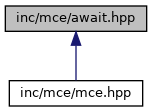#include <deque>#include <memory>#include "function_utility.hpp"#include "scheduler.hpp"#include "threadpool.hpp"#include "unbuffered_channel.hpp"

Go to the source code of this file.
Classes | |
| struct | mce::detail::await_coroutine |
| struct | mce::detail::await_worker |
| struct | mce::detail::await_worker::worker_task |
| struct | mce::detail::await_threadpool |
| specialized threadpool implementation for handling blocking tasks More... | |
Functions | |
| template<typename Callable , typename... As> | |
| detail::function_return_type< Callable, As... > | mce::detail::await_ (std::false_type, Callable &&cb, As &&... args) |
| template<typename Callable , typename... As> | |
| int | mce::detail::await_ (std::true_type, Callable &&cb, As &&... args) |
| template<typename Callable , typename... As> | |
| detail::convert_void_return< Callable, As... > | mce::await (Callable &&cb, As &&... args) |
| Execute Callable potentially on a different thread and block current context until operation completes. More... | |
| bool | mce::is_await () |
| size_t | mce::await_count () |
Detailed Description
trivial execution of blocking operations (such as in/out operations)
Function Documentation
◆ await()
|
inline |
Execute Callable potentially on a different thread and block current context until operation completes.
await() accepts a Callable, and any number of arguments, and returns the result of calling the given Callable with the given arguments. await() is a special function which enables blocking Callable calls made from a coroutine to be executed safely so that it does not block other coroutines from running.
Anything that does an OS level block (non-mce sleeping, std::mutex::lock(), std::condition_variable::wait(), file operations, etc...) can be executed within this call without blocking other scheduler coroutines.
Because the caller of mce::await() is blocked during this operations runtime, it is safe to access values on the caller's stack by reference.
If mce::await() is called outside of a coroutine running on a mce::scheduler OR mce::await() was called inside another call to mce::await(), the argument Callable is executed immediately on the current thread instead of on another thread. Otherwise, the calling coroutine will be blocked an the operation passed to mce::await() will be executed on another, dedicated thread inside another mce::scheduler.
Calls (or implicit calls) to this_scheduler(), or this_threadpool() made within a call to mce::await() will return the values they would have if they had been called outside of mce::await(). That is, code running in mce::await() will be able to schedule operations as if it was running in its original execution environment. IE, calls to mce::concurrent() or mce::parallel() will function "normally".
- Returns
- the result of the Callable or 0 (if Callable returns void)
◆ await_count()
|
inline |
- Returns
- the count of active await worker threads
◆ is_await()
|
inline |
- Returns
- true if executing on an await() managed thread, else false